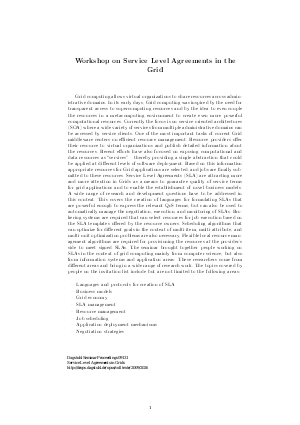09131 Executive Summary – Service Level Agreements in Grids
Authors Hans Michael Gerndt, Omer F. Rana, Gregor von Laszewski, Wolfgang Ziegler
-
Part of:
Volume:
Dagstuhl Seminar Proceedings, Volume 9131
Part of: Series: Dagstuhl Seminar Proceedings (DagSemProc) - License:
 Creative Commons Attribution 4.0 International license
Creative Commons Attribution 4.0 International license
- Publication Date: 2009-06-04
File

PDF
DagSemProc.09131.2.pdf
- Filesize: 68 kB
- 4 pages
Document Identifiers
Subject Classification
Keywords
- Service Level Agreement
- Grid Computing
- SLA Negotiation
- SLA Policies
- SLA Implementations
Metrics
- Access Statistics
-
Total Accesses (updated on a weekly basis)
0Document
0Metadata
Abstract
Grid computing allows virtual organizations to share resources across administrative domains. In its early days, Grid computing was inspired by the need for transparent access to supercomputing resources and by the idea to even couple the resources in a metacomputing environment to create even more powerful computational resources. Currently the focus is on service-oriented architectures (SOA) where a wide variety of services from multiple administrative domains can be accessed by service clients. One of the most important tasks of current Grid middleware centers on efficient resource management. Resource providers offer their resource to virtual organizations and publish detailed information about the resources. Recent efforts have also focused on exposing computational and data resources as “services” – thereby providing a single abstraction that could be applied at different levels of software deployment. Based on this information appropriate resources for Grid applications are selected, and jobs are finally submitted to these resources. Service Level Agreements (SLA) are attracting more and more attention in Grids as a means to guarantee quality of service terms for grid applications and to enable the establishment of novel business models. A wide range of research and development questions have to be addressed in this context. This covers the creation of languages for formulating SLAs that are powerful enough to express the relevant QoS terms, but can also be used to automatically manage the negotiation, execution, and monitoring of SLAs. Brokering systems are required that can select resources for job execution based on the SLA templates offered by the resource owners. Scheduling algorithms that can optimize for different goals in the context of multi-item, multi-attribute, and multi-unit optimization problems are also necessary. Flexible local resource management algorithms are required for provisioning the resources at the provider’s side to meet signed SLAs. The seminar brought together people working on SLAs in the context of grid computing mainly from computer science, but also from information systems and application areas. These researchers come from different areas and bring in a wide range of research work.
Cite As Get BibTex
Hans Michael Gerndt, Omer F. Rana, Gregor von Laszewski, and Wolfgang Ziegler. 09131 Executive Summary – Service Level Agreements in Grids. In Service Level Agreements in Grids. Dagstuhl Seminar Proceedings, Volume 9131, pp. 1-4, Schloss Dagstuhl – Leibniz-Zentrum für Informatik (2009)
https://doi.org/10.4230/DagSemProc.09131.2
BibTex
@InProceedings{gerndt_et_al:DagSemProc.09131.2,
author = {Gerndt, Hans Michael and Rana, Omer F. and von Laszewski, Gregor and Ziegler, Wolfgang},
title = {{09131 Executive Summary – Service Level Agreements in Grids}},
booktitle = {Service Level Agreements in Grids},
pages = {1--4},
series = {Dagstuhl Seminar Proceedings (DagSemProc)},
ISSN = {1862-4405},
year = {2009},
volume = {9131},
editor = {Hans Michael Gerndt and Omer F. Rana and Gregor von Laszewski and Wolfgang Ziegler},
publisher = {Schloss Dagstuhl -- Leibniz-Zentrum f{\"u}r Informatik},
address = {Dagstuhl, Germany},
URL = {https://drops.dagstuhl.de/entities/document/10.4230/DagSemProc.09131.2},
URN = {urn:nbn:de:0030-drops-20261},
doi = {10.4230/DagSemProc.09131.2},
annote = {Keywords: Service Level Agreement, Grid Computing, SLA Negotiation, SLA Policies, SLA Implementations}
}
